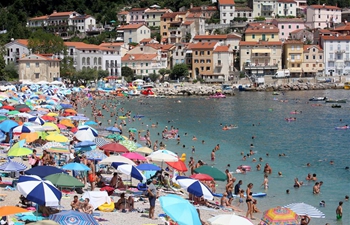ROME, Aug. 13 (Xinhua) -- The man who could be Italy's next prime minister has said he is determined to reduce the tax burden on Italian companies and individuals even if it means he will have to fight the European Union (EU) to do it.
The latest statement from Deputy Prime Minister Matteo Salvini is a plan to eliminate at least 1 billion euros (1.1 billion U.S. dollars) in property taxes, erasing part of what is one of the country's least popular taxes, put in place in 2012.
"When the government should be looking for new sources of income [Salvini] is looking to reduce income already coming in," Alessandro Petretto, an economist with the University of Florence and a member of the scientific committee with parliament's budget office, told Xinhua. "Lowering taxes by 1 billion euros won't change much for many people, but that is money the government has to find somewhere else."
But measures with broad support are important for Salvini, who is the most likely figure to replace Prime Minister Giuseppe Conte. Salvini, who is head of the nationalist, right-wing League -- the country's biggest political party, has called a confidence vote that could force Conte to resign. If that happens, Salvini has called for snap elections that could give the League enough votes for it to form a government on its own or in conjunction with one or two second-tier parties.
Salvini wants it to be known that if things go according to his plan, Italians can plan on a reduced tax bill.
"Income taxes will be reduced ... for millions of Italian workers, with fiscal peace with" the tax collection authority, Salvini said this week via social media. "We will not increase the value-added tax and there will be a property tax reduction."
Salvini's social media posts are widely popular among his supporters. But his promises about taxes put him -- and Italy if he is prime minister -- on a collision course with the European Commission, which has been pressuring Italy to reduce its public debt, which is the equivalent to 134 percent of the country's gross domestic product, one of the highest levels in the world.
Last year, Italy locked horns with the European Commission for eight weeks before the two sides compromised on a budget deficit of 2.04-percent of gross domestic product for 2019. With Italy likely to overshoot that limit, speculation is that the commission will put pressure on Italy to cut the deficit even more than promised last year or risk becoming the first EU member state to be fined for budgetary issues.
The more the government reduces taxes, the more it will have to cut spending in order to stay within budgetary limits. But Salvini has also said the budget cuts were off the table.
"We refuse to go to Brussels with our hats in our hands," Salvini told a political rally last week, referring to the seat of the EU. "If the European Union lets us cut [taxes] then that's fine. But if they don't, we will do it anyway."













